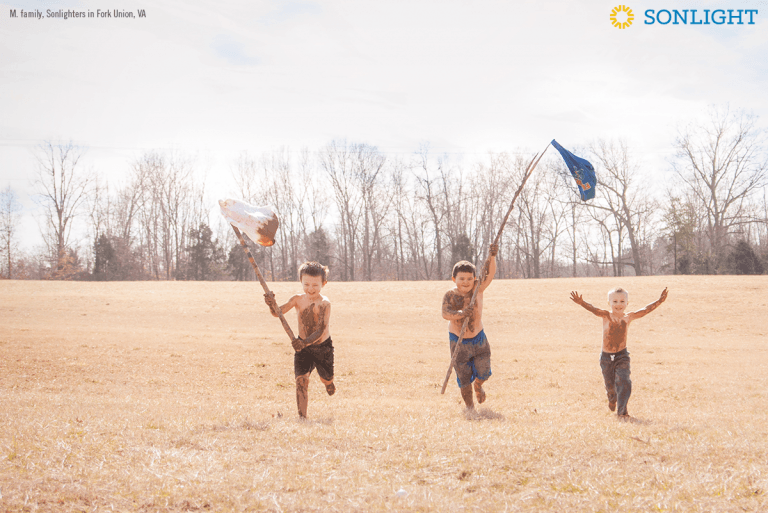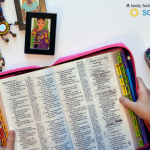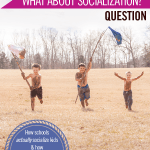
I’m a second-generation homeschooler, so I’ve heard questions people ask homeschoolers for as long as I can remember. Curiosity comes in waves, and some of the most commonly asked topics tend to evolve over the years. A few questions, though, persist. Perhaps you, too, are wondering
First of all, a quick spoiler alert: colleges love homeschoolers. They really do! And while many of the academic questions about home education have been answered in big ways over the years, the socialization myth lives on. This is simultaneously fascinating and confusing to me.
Continue reading below or listen here:
The Socialization Question Relies on an Incorrect Belief About the Public School System
Homeschooling has been fairly mainstream in the United States for some time now, at least long enough that many people have likely met not just a homeschooled kindergartner but also a homeschool graduate who’s now a likable, employed, successful, and well-adjusted adult.
Yet for whatever reason, the fears and myths surrounding the socialization question persist. Why is this? What cultural influences drive this question?
At its root, the socialization question relies on the ingrained—but inaccurate—belief that no shy, dysfunctional, or socially awkward child or adult ever emerged from the public school system.
Let’s think about that for a second. Is it really true that traditional brick-and-mortar education is the antidote for social dysfunction? Of course not! The socialization question itself reveals a clear double standard at play. When a disturbed individual surfaces on the news (night after night, in every local new station in the country), no one ever reports that the socialization practices of the public system are flawed and need to be changed.
The Socialization Question Relies on an Incorrect Perception of When Socialization Occurs
It’s easy at times to hold on to an idyllic view of the traditional classroom:
- a caring teacher
- a loving group of friends
- everyone’s individual needs being met
- all the educational opportunities we could dream of
Yet when we break down traditional education and look at it with a realistic lens in light of the socialization question, how much socialization—conversing, bonding, and making friends—is actually happening at a classroom level?
The truth is, as anyone who’s ever helped in a room full of young students can attest, teachers constantly remind students to stop talking, be quiet, and listen.
Yes, listening is a valuable skill, but when the classroom is held up as the gold standard for forming friendship and relationships, things simply don’t add up. In reality, most true socialization in school does not happen in a classroom, but during the fringe times of schooling:
- at recess (which are dwindling at an alarming rate in US schools)
- on class outings and field trips
- during extra curricular activities
Homeschool parents can offer their children all this—and much, much more—due to the tremendous scheduling flexibility which homeschool offers. While traditionally educated children are sitting in a desk next to same-age peers, homeschooled children have the chance to be plugged in to a wide range of mixed-age experiences, including
- field trips
- travel
- group music lessons
- specialized classes
- sports leagues
- scouting groups
- internships
- clubs
- camps
- job shadowing
The Socialization Question Relies on an Incorrect and Narrow Definition of Socialization Itself
When my daughter was three, she carried on a vibrant conversation with the stranger across the picnic table at the park. “She speaks so well,” exclaimed the woman, turning toward me. “Where does she go to daycare?” When I explained I stayed at home with my daughter instead of sending her to daycare, the woman was shocked, exclaiming, “Then how did she learn to talk?” (I tried not to take it personally; myths tend to persist in the face of the facts.)
Although it defies logic, some people—like the woman I met at the park—continue to believe a group of extremely young, babbling, pre-verbal, children are better qualified to teach language through interaction than a verbal adult.
But much of this pervasive mindset stems from believing the public school system’s very narrow definition of socialization: interaction between peers born the same year. Due to this limiting view, some people have never thought of interaction outside this narrow age range as legitimate socialization.
The truth is, the traditional model of education—and the subsequent narrow definition of socialization—actually widens the gap between generations, resulting in more social awkwardness.
Think about it. Traditionally-schooled kids spend the majority of each six-hour school day around only those children who are close in age. They tend to initiate conversation and seek friendship primarily within that range.
Homeschooled kids, on the other hand, regularly converse with everyone from the elderly to the very young—not just same-age peers. As a result, homeschoolers are far more comfortable interacting with a wider range of humanity than the average age-segregated student. And the natural flow of multi-generational interaction prevalent in homeschooling, too, far more closely resembles real life—and real life workplaces—than does a traditional school setting.
So take heart, friends, especially if you’re just beginning this home education journey. Be empowered and encouraged in the face of ill-informed “But what about socialization?” questions. These doubts are flawed at the very root, based on
- incorrect beliefs about the public school system,
- incorrect perceptions of when socialization occurs, and
- incorrect and narrow definitions of socialization itself.
Non-traditional education bypasses these pitfalls, and allows for a wide range of (true!) socialization.
There’s no question. Homeschooling prepares kids very well for the real world.
Experience what it's like to use Sonlight. Request your FREE book and schedule here.









It still amazes me how my family can be out socializing with people... Serving at the soup kitchen, visiting the elderly, participating in many community activities and creating opportunities and still get asked this question. Hello! Isn't that what we are doing right now as you ask this question?
No one bats an eye if there is a child who goes to school, but struggles to make friends and parents who are not intentional about other opportunities. I mention homeschool and I have gotten so many comments, it is very interesting to see how cultural expectations, misinformation and myths persist. The school is not the only place for socialization and I agree, not the best place for it either.
Seeing that you are a homeschool graduate, I am surprised that you were able to gather enough social experience through your restricted access to peer groups that clearly should define how you should think and act to write this article. All of our society's socialization problems such as bullying, negative peer pressure, limited understanding about life come about when you do not interact primarily with people your own age. I salute you for courageously stepping forward and breaking your social awkwardness to post this to the public and share it on a social media.